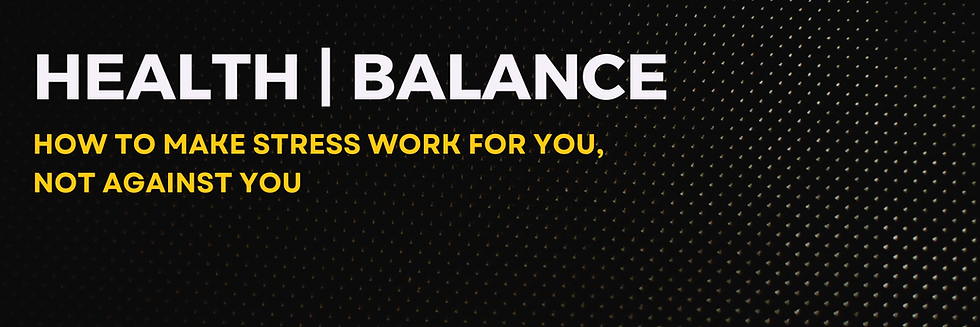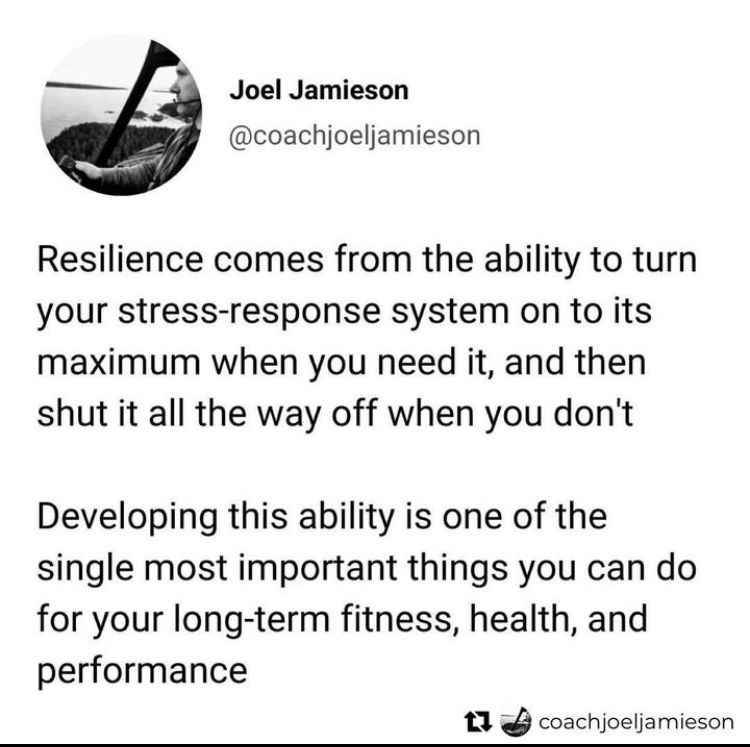
May 19, 2023
In today’s newsletter, I’m going to teach you why and how to build a stress management practice.
Stress is a double-edged sword. It can either build up our health and wellbeing, or it can slowly wear us down and take years off of our life.
The key to making stress work for you rather than against you is to learn to activate the sympathetic stress response (”fight-or-flight”) when needed, and to shut it off and activate the parasympathetic response (”rest-and-digest”) when the stressor is over.
We want our response to stressors to be acute, and we want to respond effectively to whatever it is that’s triggering it - an emergency, an intense workout, an interpersonal conflict. Then, we want to activate relaxation and recovery mode and spend most of our time in that state of mind.
Here’s how Joel Jamieson puts it:

Unfortunately, most people in today's world constantly have their fight-or-flight responses activated and never quite let go and relax. Our overworked bodies never fully rest, and our over-stimulated minds never quite let go of the problems that irk us.
Many people don’t even realize just how stressed they are. If they do, they think they’re powerless to do anything about it.
So why is this such a big problem?
Stress makes us more susceptible to chronic disease. As stress expert Robert Sapolsky puts it, “Stress doesn’t kill us outright very often, but it sure makes other things that kill you more effective at doing it.”
One of the reasons for this is the chronically elevated cortisol that accompanies chronic stress. Cortisol is meant to spike at particular times, then drop - not stay high all day and night, as it does for many of us.
Chronic stress is also associated with chronically high blood glucose, poor digestion, and poor sleep.
If you’re someone that lives in a virtually constant state of stress, you might be feeling pretty hopeless right now - in fact, I may have just made your stress even worse!
But what if I told you that you can actually learn to control your stress response and consciously shift your body into that parasympathetic, rest-and-recovery mode?
Here's how.
Step 1: Identify your unique stressors.
First, simply start to be mindful of times throughout the day when your stress response is activated. Most people underestimate how stressed they are because they’re just not aware of how they’re feeling, so start building some awareness around this.
Be aware of times throughout the day when your heart rate is elevated, you’re starting to breathe hard, or negative emotions (such as anger, despair, or frustration) are running away with you. You may have other telltale signs as well - for example, some people get pain in their chest or stomach when their stress response is activated.
The point here is just to start becoming aware in those moments when your stress response is activated. Realize that there is lots of individuality here - the things I find stressful might not be the things you find stressful. The key is to start identifying your unique triggers.
Step 2: If it is possible and/or ethical to eliminate these stressors completely, do it. If this is not possible, brainstorm ways you can reduce their chronic nature.
Some chronic stressors can be eliminated completely - for example, if you find that scrolling Facebook just adds to your stress level, you might be able to deactivate your account altogether. If a particular commute stresses you out, you might be able to find a different route that has less traffic.
But sometimes, stressors can’t be eliminated altogether. For example, I love my 4-year old daughter with all my heart, but she is far and away the source of much of my anxiety (I'm sure most parents can relate!). The solution here is clearly not to eliminate the stressor, but to find ways to shift my mindset and put up appropriate boundaries.
The goal is to make these stressors acute and finite, not chronic. Put boundaries around them, if at all possible, so that the stress of dealing with them doesn’t leak out and affect the rest of your day. Work on reframing these stressors to find meaning in them, even when they cause suffering. Two books that have been invaluable to me in this regard are Viktor Frankl’s “Man’s Search for Meaning” and Ryan Holiday’s “The Obstacle is the Way."
Here are a few examples. If email is your trigger, limit your email time to 1-2 defined times of day. If social media stresses you out, delete the app from your phone and turn off notifications. If your stressor is work, see if you can get outside on your break times and do a quick meditation or walk in nature. If it’s a relationship, practice controlling what you can control and letting go of the rest, then have a constructive conversation with your loved one to see how you can mutually encourage each other better.
Step 3: Find at least one stress-management practice you will do consistently.
There are certain practices which, when done consistently, can mitigate the damage done from chronic stress and help you manage your response to it.
Aim for at least 5 minutes per day. It’s better to do something every day for 5 minutes than once per week for 30 minutes. Remember, it’s not just the time spent doing the practice - it’s the time afterwards, when you’re basking in the afterglow of it.
Here is a non-exhaustive list of ideas:
Meditation (Insight Timer, Emily Fletcher's Ziva meditation technique)
Journaling to process thoughts and emotions
Prayer (incorporate stillness as well as gratitude - I love the Pray As You Go app)
Walk (bonus points for doing this without your phone, in a natural space)
Parasympathetic breathwork (a simple technique taught in this YouTube video)
(Safe) sun exposure
Spending time on a fun hobby
Hugging your loved ones
Find ways to work your practice of choice into your daily life and do it as consistently as possible. Over time, the goal is to see your stress response go up, deal constructively with the things triggering it, then come back down to "rest-and-digest" mode.
This is how you can make stress work for you, rather than against you. As Sapolsky puts it,
“We don’t hate stress, we hate the wrong amount of stress. When it’s the right amount, we love it.”
With intentional practice, stress can become an ally, rather than an enemy.
To learn more about what's happening in your body when you're chronically stressed, listen to Robert Sapolsky's interview with Peter Attia here.
If you enjoyed this newsletter, click the button below. You'll be taken to the email subscriber page to get each edition of HWB in your inbox every Friday.
).png)
Comments